关于教育的英语对话
英语四级口语对话场景20篇

英语四级口语对话场景20篇以下是20篇英语四级口语对话场景,每篇对话包含两个角色的交流,以及相应的中文翻译。
这些对话涵盖了日常生活、学习、工作等多个方面,有助于提高学生的口语表达能力和听力理解能力。
场景1:校园相遇A:Hi,long time no see.How's everything going?B:Hey,it's always a pleasure to see you.Everything's fine,thanks.You know,exams are coming up,so I've been studying a lot.A:Yeah,I hear you.Good luck with your exams!B:Thanks,I need it.翻译A:嗨,好久不见。
最近怎么样?B:嘿,见到你总是很高兴。
一切都好,谢谢。
你知道的,考试就要到了,所以我一直在学习。
A:是啊,我明白。
祝你考试顺利!B:谢谢,我需要这个祝福。
场景2:图书馆借书A:Excuse me,could you help me find a book?B:Sure,what book are you looking for?A:"The Great Gatsby"by F.Scott Fitzgerald.B:Ah,yes.It's in the literature section,over there on the second shelf. A:Thank you so much!B:No problem,enjoy your reading.翻译A:打扰一下,你能帮我找一本书吗?B:当然可以,你在找什么书?A:F·斯科特·菲茨杰拉德的《了不起的盖茨比》。
B:啊,是的。
它在文学区,那边的第二个架子上。
A:非常感谢!B:没问题,享受你的阅读。
八年级上册英语口语对话

【导语】孩⼦们⼀般在七、⼋年级左右受到影响。
这正是他们需要作出⼀些决定的时候。
下⾯是由给⼤家整理的⼋年级上册英语⼝语对话,供⼤家参阅!【篇⼀】⼋年级上册英语⼝语对话 What should we do before help arrives? Ms James: This morning’s class is about first aid, or giving someone basic medical help. Let’s imagine an accident. A boy is lying at the bottom of the stairs. He is in pain. What can we do the help him? Betty: First of all, find out what’s wrong with him. Ms James: How do we do that? Betty: Ask him. Ms James: OK. But he could have trouble hearing you or speaking to you. Lingling: Shout for help? Call 120? Ms James: Good idea, but What do we do before help arrives? Tony: Make him comfortable. Ms James: And how can we do that? Tony: Lift him up and sit him on a chair? Ms James: No, that could be harmful! Betty: Make sure he’s warm. Cover him with a coat. Ms James: That’s such good advice that you could be a doctor, Betty! 詹姆斯⼥⼠:今天早晨这节课是关于急救的,或者给某⼈基本的医疗帮助。
英语对话

54.No,sir,I'm still single.没有,先生,我还是单身。
55.I'm planning to get married.我正打算结婚。
56.Is your wife working?你太太工作吗?
57.What does your husband do?你先生做什么?
A:My birthplace is Suzhou.
I:Are you a resident of Shanghai?
A:No.
I:Where is your domicile place?
A:My domicile place is Nanjing.
I:Give me your telephone number,please.
A: I am very happy that I am qualified for this interview.
Dialogue B
I: May I help you?
A: Yes,I'm here for an interview as requested.
I: You are Miss Li?
I: Nice to meet you too.Please sit down.
A: Thank you,sir.
I: We have received your letter in answer to our advertisement.I would like to talk with you regarding your qualifications for this position.
32.What's your age?你多大了?
15篇英语补全对话
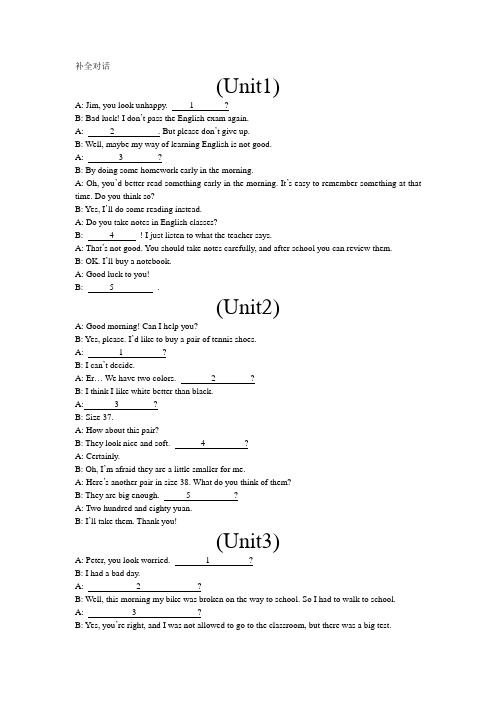
补全对话(Unit1)A: Jim, you look unhappy. 1 ?B: Bad luck! I don’t pass the English exam again.A: 2 . But please don’t give up.B: Well, maybe my way of learning English is not good.A: 3 ?B: By doing some homework early in the morning.A: Oh, you’d better read something early in the morning. It’s easy to remember something at that time. Do you think so?B: Yes, I’ll do some reading instead.A: Do you take notes in English classes?B: 4 ! I just listen to what the teacher says.A: That’s not good. You should take notes carefully, and after school you can review them.B: OK. I’ll buy a notebook.A: Good luck to you!B: 5 .(Unit2)A: Good morning! Can I help you?B: Yes, please. I’d like to buy a pair of tennis shoes.A: 1 ?B: I can’t decide.A: Er… We have two colors. 2 ?B: I think I like white better than black.A: 3 ?B: Size 37.A: How about this pair?B: They look nice and soft. 4 ?A: Certainly.B: Oh, I’m afraid they are a little smaller for me.A: Here’s another pair in size 38. What do you think of them?B: They are big enough. 5 ?A: Two hundred and eighty yuan.B: I’ll take them. Thank you!(Unit3)A: Peter, you look worried. 1 ?B: I had a bad day.A: 2 ?B: Well, this morning my bike was broken on the way to school. So I had to walk to school.A: 3 ?B: Yes, you’re right, and I was not allowed to go to the classroom, but there was a big test.A: Well, the school rules must be obeyed, you know.B: 4 . But it’s not fair. I think I should be allowed to take the test later.A: 5 . Maybe you can talk to your teacher about it after school.B: Yeah, I’ll go and talk to the teacher.(Unit4)A: Hey, did you read today’s newspaper? It’s said that an old man gave one million dollars to the charity.B: Wow! 1 !A: Yes, he’s really a nice man. 2 ?B: If I had a million dollars, I’d give half of them to the zoo.A: Why would you do that?B: 3 .A: That’s a good idea. I think helping animals is helping people. 4 ?B: I would build a new school for the poor children in my hometown with the rest of the money. A: 5 .(Unit5)A: Hello, Kate! How was your summer vacation?B: 1 .A: Where did you go?B: I went to Yichuan with my parents.A: 2 ?B: I think it’s one of the most beautiful cities in the northwest of China. I like it very much.A: 3 ?B: We stayed there for five days. We’ve been to many wonderful places.A: 4 ?B: I think Sand Lake is the best. When I was there, I lost myself in the beautiful scenery.A: 5 ?B: Lots of things, such as swimming, boating, fishing and riding camels.A: Sounds great!(Unit6)A: Hi, Linda. Are you listening to that CD again?B: Yes, Susan. I like it a lot.A: 1 ?B: Four times. Every time I listen to it, it makes me relaxed.A: 2 ?B: Han Hong. She writes her own songs. I think she is a great singer.A: 3 . She is my favorite singer, too.B: Really? Let’s listen to the CD together.A: Sure!B: 4 ?A: I haven’t listened to such a great CD for long. 5 ?B: In a big supermarket near my house. If you want to buy one, I can go with you.A: Thank you!(Unit7)A: Hello, Alice.B: Hello, Kate.A: The summer vacation is coming. 1 ?B: I’m going on a summer camp to Canada. I want to improve my English.A: That sounds great! 2 ?B: I’d like to visit Niagara Falls, CN Tower and some other places of interest.A: 3 ?B: With my friends.A: 4 ?B: For about three weeks. We’ll be back at the end of July.A: 5 .B: Thank you!(Unit8)A: Excuse me, sir.B: 1 ?A: Yes, could you please tell me where I can post this letter?B: Sure. There’s a post office over there. Go down this road, and then turn left at the third traffic lights. At the end of the road you will find it. 2 .A: 3 ?B: It is about five kilometers away from here.A: 4 ?B: It will take you about 20 minutes to walk there. You’d better take a bus.A: OK, I see. Thank you.B: 5 .(Unit9)A: Excuse me, 1 ?B: It’s nine o’clock.A: Wow, your watch is so beautiful. 2 ?B: I bought it in Xiaogan Supermarket.A: 3 ?B: It is made in Switzerland(瑞士).A: Oh, I see. I want to buy one, too. Could you tell me how I can get to Xiaogan Supermarket. B: You can take a No.5 bus, and then get off the bus at the Bridge bus stop. You’ll find it front of you.A: 4 ?B: It’s only two kilometers from here.A: 5 .B: You are welcome.(Unit10)A: Oh, I don’t have much time left. I’d better hurry and finish my homework. 1 ? B: 2 . It’s too difficult for me.A: Don’t worry. 3 .B: It’s very kind of you. But I think I can do it myself. Can you lend me your dictionary?A: With pleasure. 4 .B: Thanks. By the way, is Miss Li in the teachers’ office?A: No, she’s out at the moment.B: 5 ? I have some questions to ask her.A: I think she’s at the library. She told me she wanted to borrow some books.B: OK, I will wait for her here.(Unit11)A: Hi! How beautiful your motor bike is !B: 1 . I bought it yesterday,A: 2 ?B: It is made in Chongqing.A: I’m going to buy one. 3 ?B: In Chifeng Department Store. And there are many different colors. 4 ?A: I like black best. 5B: 2500 yean.A: The price is OK. I’m going to the store this weekend. Bye-bye.B: Bye-bye.(Unit 12)A: I’m going to Tokyo.B: Sounds great. 1 ?A: Because I’m going to Tokyo as an exchange student in my school.B: 2 ?A: I’ll stay there tor half a year.B: 3 ?A: No, I have never been to Japan. So what am I supposed to do there?B: 4 .A: That’s a good idea. I know two students from Tokyo, I’ll ask them.B: 5 ?A: Yes, I can also find some information on the Internet. If I know what I am supposed to do in Japan, I think I will feel at home when I am in Tokyo.B: You are right, Have a nice journey,(Unit 13)A: Oh, the history museum is still closed. We are early.B: 1 ?A: It opens at nine o’clock.B: We have it wait for about 10 minutes. 2 ?A: Yes, several times.B: 3 ?A: Yes, there are many interesting things. You can even see some old guns.B: 4 ?A: I think the museum is educational. We can learn about the history of our country,B: I think so. It’s already 9:10. 5 .A: OK.(Unit 14)A: Winter holiday is coming. 1 ?B: I’m going to see my grandparents in my hometown.A: 2 ?B: I’m going with my parents.A: 3 ?B: We’ll stay there for about a month. We will be back after the Spring Festival.A: 4 ?B: I will visit some places of interest, help my grandma do some housework and so on.A: 5 . Wish you a happy holiday!B: Thank you.(Unit 15)A:Hey, betty! What do you call these big, gray things in the water?B: 1 .A: What?B: Manatees. In fact, They’re very gentle and shy.A: 2 ?B: An average one is about 10 feet long and weighs about 1000 pounds.A: 3 ?B: They eat underwater plants and vegetation.A: 4 ?B: Yes, they are. But we’re trying to save them.A: Then why are they endangered?B: Because their favorite habitats have been polluted. Also, sometimes there isn’t enough food for all of them.A: I am sorry to hear that. 5 .B: I agree with you. You can join us and try to save them.(Units 1-15)A: Hi, Laura. 1 ?B: Certainly. I went there last summer.A: 2 ?B: Yes, there are Ocean Park, Victoria Peak and some other places of interest.A: 3 ?B: Of course. We spent two days going shopping. Hong Kong is known as the Shopping Heaven(购物天堂).A: 4 ?B: I also went to a concert. The night-life there is lively.A: 5 ! I want to there some day.B: If you have a chance to go there, take it.。
教育教学 问路的英语情景对话

问路的英语情景对话【篇一】苏珊: Excuse me! I am new to the campus. Do you know where the student cafeteria is?打扰了.我是新生.请问你知道学校自助餐厅在哪里吗?凯西: Sure! Do you have a map?当然!你有地图吗?苏珊: Yes, here it is.有.地图在这儿.凯西: Let`s see--Here`s where we are right now. To get to the cafeteria, you`ll need to cross this square and go to the south.我看看-- 我们现在的位置在这儿.要到自助餐厅的`话.你得穿过这个广场然后向南走.苏珊: OK好的.凯西: And then the cafeteria is about five hundred yards past the gym, on your left. You`ll see a sign in front of the building.自助餐厅是在过了体育馆大概500码处.就在你左边.你会在建筑物前看到标志.苏珊: No wonder I got lost. I was heading in the wrong direction! Anyway, thanks a lot for your help.难怪我会迷路.我走错方向了.无论如何.非常感谢你的帮忙.凯西: No problem. Good luck!不客气.祝你好运.【篇二】A: Excuse me, Where am I on this map?B: We are here, bus station, we are in the heart of the city.A: Oh ! I think I’m lost. Can I go from here to the railway station?B: Head straight up the street about two blocks then turn left.A:对不起,请问我在地图上的啥地方?B:我们在这里,汽车站,我们现在在市中心。
英语对话100练(附答案)
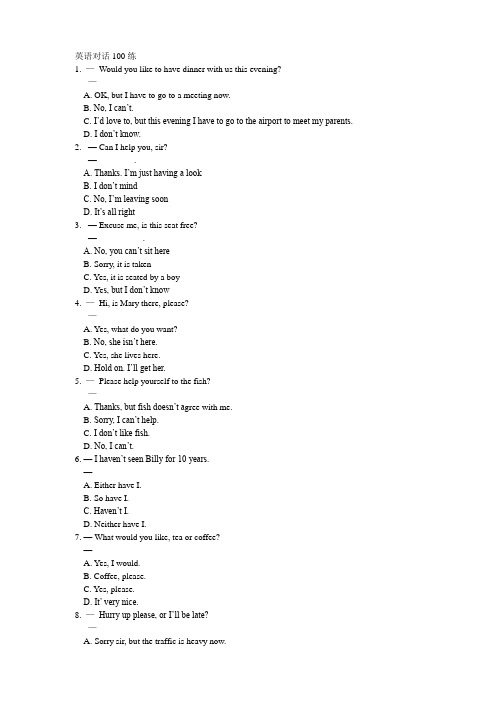
英语对话100练1. —Would you like to have dinner with us this evening?—______________A. OK, but I have to go to a meeting now.B. No, I can’t.C. I’d love to, but this evening I have to go to the airport to meet my parents.D. I don’t know.2. — Can I help you, sir?— ________.A. Thanks. I’m just having a lookB. I don’t mindC. No, I’m leaving soonD. It’s all right3. — Excuse me, is this seat free?— __________.A. No, you can’t sit hereB. Sorry, it is takenC. Yes, it is seated by a boyD. Ye s, but I don’t know4. —Hi, is Mary there, please?—______________A. Yes, what do you want?B. No, she isn’t here.C. Yes, she lives here.D. Hold on. I’ll get her.5. —Please help yourself to the fish?—______________A. Thanks, but fish doesn’t a gree with me.B. Sorry, I can’t help.C. I don’t like fish.D. No, I can’t.6. —I haven’t seen Billy for 10 years.— ________A. Either have I.B. So have I.C. Haven’t I.D. Neither have I.7. — What would you like, tea or coffee?— _________A. Yes, I would.B. Coffee, please.C. Yes, please.D. It’ very nice.8. —Hurry up please, or I’ll be late?—___________A. Sorry sir, but the traffic is heavy now.B. Well, it’s alright, sir.C. How can you say that, sir?D. Oh, we are going the right way.9. —Excuse me, but can you tell me the way to the airport?—___________A. Don’t ask that.B. Sorry, I’m a stranger here.C. No, I can’t say that.D. No, you’re driving too fast.10. —May I help you, sir?—______________A. Mind your own business.B. I’m just looking. Thanks.C. Sorry. I don’t need your help, thank you.D. If you want to help me, I’ll be glad to accept it.11. — Do you know who telephoned me?— ________A. I heard it was Sally.B. Yes, I remember it now.C. No, I did n’t phone you.D. Yes, I know you well.12. — Excuse me, how far is the airport from here?— _________A. You can take a taxi.B. It’s about thirty miles.C. I’ll fly to Sydney.D. It’s only six hundred dollars.13. —Are you ready to order desert, please?—____________A. Yes, please.B. Please don’t order it.C. No, don’t mention it.D. Yes, I’d like to have some chocolate cake.14. —Did Tom tell you to water the flowers?—____________.A. No. And so did I.B. No. And neither did I.C. He did. And so I did.D. He did. And so do I.15. —Shall we sit up here on the grass or down there near the water?—____________A. I’d rather stay here if you don’t mind.B. Sorry, I don’t like neither.C. Certainly, why not?D. Yes, we like these two places.16. —You’ve given us a wonderful Chinese dinner, Mrs. Wang.— _________A. Oh, I don’t think I cooked very well.B. I’m glad you enjoyed it.C. Come again when you are free.D. It’s not necessary for you to say so.17. —I’m sorry. Bob’s not in his office.— _________A. Would you like to leave a message?B. Are you sure for that?C. Can you take a message for me?D. Can you phone me?18. —Would you mind changing seats with me?—_____________A. Yes, you can.B. Of course, I like to.C. No, I don’t mind.D. Certainly, please do.19. —Can I help you with your luggage?—______________A. No thanks. I can manage it.B. No, many thanks. I can do.C. No, not necessary. Thank you anyway.D. No, you needn’t. Thank you anyway.20. —Are you feeling better now?—______________A. Well, no better, thank you.B. Well, not too good yet. Better than I was though.C. Well, it doesn’t matter, I’m all right now.D. Well, never mind, I’m much better now.21. — Hello, may I talk to the headmaster now?— __________.A. Sorry, he is busy at the momentB. No, you can’tC. Sorry, you can’tD. I don’t know22. — Do you think I could borrow your dictionary?— ________.A. Yes, you may borrowB. Yes, go onC. Yes, help yourselfD. It doesn’t matter23. —Did you have a good trip?—______________. It was really tough and I was exhausted.A. No, I’m afraid notB. Yes, very pleasant tripC. No, I hadn’tD. Yes, it did24. —___________ if you’d serve me as quickly as possible as I’ve got an appointment.—I’ll do my best, Madam.A. It would be very kind of youB. It would be very helpfulC. I’d be most delightfulD. I’d be most grateful25. —That was a delicious dinner.—___________. Would you like to have another coffee?A. Thank you. Don’t mention itB. You’re welcomeC. I’m glad you enjoyed itD. Not so delicious, I’m afraid26. —John, come and sit in the sofa. Could I get you something to drink?—______________A. No, don’t trouble. I’ve drunk enough.B. No, you couldn’t. I’m not thirsty.C. Yes, please. I’d like some Sprite.D. Yes, you could. I’d like some Coke.27. —____________—I’m sorry. Didn’t you order fried shrimp?A. Sorry, this isn’t my dish.B. Excuse me, this isn’t what I paid for.C. Sorry, this isn’t my order.D. Excuse me, this isn’t what I ordered.28. —I believe we’ve met somewhere before.— No, ________.A. it isn’t the sameB. it can’t be trueC. I don’t think soD. I’d rather not29. —Hello. Could I speak to Justin, please?—____________A. Yes, you could.B. Speaking, please.C. Who are you?D. Of course.30. —Hey, how are you, Susie? Gee, we haven’t seen each other for three years!—____________A. Fine, how have you been?B. Nice to meet you.C. Fancy meeting you here.D. How do you do?31. —Do you mind if I call you Albert?—_____________A. Yes, just call me Al.B. Yes, you may do that.C. OK. Everyone does.D. Of course not.32. —______________—Yes, I’ll have a cheeseburger, medium rare, with French fries.A. What do you want to eat?B. Have you decided what to have yet?C. Excuse me, are you ready to order now?D. Excuse me, but who’d like to order?33. —I’m glad you like it. Please drop in any time you like.— __________A. Yes, I will.B. I’m afraid I won’t be free.C. Is it all right?D. That’s great.34. —Shall I give you a ride, Juliet? I’m leaving now.—______________. I’ve to work overtime.A. No, thanksB. No, not necessaryC. Yes, thanksD. I don’t care35. —That’s a beautiful dress you have on!—______________A. Actually, I don’t like it very much.B. Oh, thank you. I just got it yesterday.C. Yes, I think so.D. N o, it’s not that beautiful. Yours is better.36. — Will you go on a picnic with us tomorrow?— ___________A. Yes, but I’ll have English classes.B. Sorry, I have an appointment with Dr. Brown.C. I’m afraid I have no idea.D. I won’t. It’s kind of you.37. — Excuse me, when is the next flight from London due to arrive?— _________A. In half an hour.B. An hour before.C. Until the next one.D. Before another one.38. —It’s late. I had to say goodbye.—___________A. Why do you want to go now?B. I’d like to say goodbye, too.C. That’s all right.D. Hope you have a good time. See you later.39. —I’ve got a fever and a really bad headache.—___________A. Why are you so careless about yourself?B. This kind of thing happens to everyone.C. You should take good care of yourself.D. O h, that’s too bad. Why don’t you take some as pirin?40. — What about going for a walk?—_________A. It’s good for you.B. That’s all right.C. So, do I.D. Why not? A good idea.41. — I think the Internet is very helpful.— _________A. Yes, so do I.B. It’s a very good idea.C. Neither do I.D. I’d rather go surfing on it.42. —Good morning, could I speak to Tom, please?—______________A. What can I do for you?B. Who’s speaking?C. What do you want?D. Who are you?43. —How about going to the cinema tonight, Jane?—______________A. I don’t think so.B. I’m sorry, but I have to drive my mother home tonight.C. Never mind.D. Take it easy.44. — Hello, could I speak to Don, please?—__________A. Who are you?B. Who’s there?C. Who could I help?D. Who’s speaking?45. — May I help you, madam?—_________A. Sorry, I have no idea.B. Yes, I know what to say.C. You’d better give me a hand.D. Yes, I’d like 2 kilos of oranges.46. —I’m so worried about this job interview.—Don’t worry. ____________A. Take a break.B. Just give up.C. Just take it easy.D. Mind you.47. —Sorry, I’m late. My alarm clock didn’t ring.—____________A. It doesn’t matter. These things happen.B. Excuse me, sir. I never accept any apologies at all.C. Thank you. You’re welcome.D. Never mind. You don’t have to be so polite.48. —Oh dear! I’ve just broken a window.—________! It can’t be helped.A. GreatB. Never mindC. That’s fineD. Not at all49. —I had a really good weekend at my uncle’s.—________.A. Oh, that’s very nice of youB. CertainlyC. It’s a pleasureD. Oh, I’m glad to hear that50. —Have you heard about Dana? She is going to get married with Graham!—_____________A. Good luck!B. Congratulations!C. Is it a real thing?D. You’re kidding!51. —Can I get you a cup of coffee?—______________A. Sorry, I don’t like coffee.B. Thank you for the coffee.C. You can, please.D. That’s very nice of you.52. —_______________—Yes. What size is that green T-shirt?A. Anything I can do for you?B. Are you just looking around?C. Excuse me, what are you doing?D. Do you want to buy anything?53. —I doubt whether the Chinese Football Team can win the game this time.—________.A. That’s trueB. It’s hard to sayC. I like the teamD. I don’t believe it54. —I believe we’ve met somewhere before.—No, _________.A. it isn’t the sameB. it can’t be rightC. I don’t think soD. I’d rather not55. —You’ve given us a wonderful Chinese dinner, Mrs. Li.—______________A. I’m glad you enjoyed it.B. Come again when you are free.C. It’s not necessary for you to say so.D. Oh, I’m afraid I didn’t cook very well.56. —I’ve got two tickets for the match. Shall we go and watch it together?— _________A. The tickets must be expensive.B. The match must be exciting.C. Why not? Let’s go.D. The place is too far away.57. — Could I borrow your CD of English songs?— ________A. No, I am not available.B. I’m sorry. It’s not at hand now.C. It’s very kind of you.D. Thank you very much.58. —______________. May I help you?—I’d like to book a room for two for three days and nights.A. Speaking, pleaseB. Golden Star HotelC. Hold on, pleaseD. I’m John Smith59. —Must I be home before seven?—________.A. No, you needn’tB. No, you mustn’tC. Yes, you willD. No, you won’t60. —Would you rather come on Friday or Saturday?—_______.A. Yes, of courseB. No, thanksC. It doesn’t matterD. Friday61. —Your help means everything. Just don’t know how I’ll ever repay you.—___________. It’s nothing.A. It’s not a big thing to doB. It’s worth mentioningC. It’s no big dealD. It’s not worth talking about62. —Sorry about all the inconvenience.—______________A. Don’t worry about it.B. Oh, really? That’s OK.C. OK. With great pleasure.D. I’m sorry to hear that.63. —Don’t you know I am going to get married with Graham next week!—_____________A. Are you sure?B. Congratulations!C. Have you made up your mind?D. I’m sorry I would be busy at that moment.64. —What would you like to have, meat or fish?—_________.A. Either will doB. Yes, I like meatC. Yes, I like fishD. No, they are not my favorite65. —Hello, Sally. How’s everything?— _________A. Good for you.B. Oh, I agree.C. That’s right.D. Just so-so.66. — Waiter!— ________—I can’t eat this. It’s too salty.A. Yes, sir?B. What?C. All right?D. Pardon?67. —Thank you very much for giving me so much help.—________.A. No thank youB. You’re welcomeC. OKD. Thanks68. —Do you mind if I play some music?—____________. I’m writing my assignment.A. Not at allB. Of course notC. Of course I wouldD. Certainly69. —What’s there to do at night?—There are clubs, concerts, plays, and so on. ____________A. You make it.B. You find it.C. You manage it.D. You name it.70. —I’ve just heard that the tickets for Swan Lake have been sold out!—Oh, no! _____________A. It doesn’t matter.B. I knew it already.C. I was looking forward to it.D. It’s not at all interesting.71. — This is the worst film ever produced. Do you think so?—_________.A. You’re wrongB. I don’t think so, I’m afraidC. Not at allD. No, that’s not real72. —I’ll be away on a bus iness trip. Would you mind looking after my cat? — Not at all. _______A. I’ve no time.B. I’d rather not.C. I’d like it.D. I’d be happy to.73. —I’m taking my driving test tomorrow.— ________A. Cheers!B. Congratulations!C. Come on!D. Good luck!74. — Can I borrow your camera for a week?—_________.A. Sure, here you areB. Yes, you can borrowC. Yes, bring it with youD. It doesn’t matter75. —Can I do anything for you?—______________A. Never mind.B. It’s my pleasure.C. No. you can’t do anything for me.D. No, it’s alright. I can manage myself.76. —______________—I’m much better. My stomach problem is gone. Now I just feel hungry.A. Do you have anything to declare, sir?B. Good morning. May I help you?C. How are you feeling today?D. What seems to be the problem?77. — Would you like a cup of coffee?—___________.A. It’s very kind of youB. No, I wouldn’tC. Yes, pleaseD. Here you are78. — What can I do for you, madam?—________.A. I want a kilo of applesB. You can go your own wayC. ThanksD. Excuse me. I’m busy79. —Do you mind telling me where you’re from?— _________.A. Certainly. I’m from LondonB. Sure. I was born in LondonC. Not really, you can do itD. Certainly not. I’m from London80. — Can I help you with your luggage?—__________.A. Thank you. I can manage it myselfB. No way. I can do it myselfC. No, I don’t need your helpD. You do your things, please81-90 AACBB DBCBD81. —Let’s take a coffee break, shall we?—______________, but I can’t.A. I wish I couldB. You will if you wantC. We shall do itD. OK, it’s great82. —We’ve made an appointment with the students. Can you come at seven in the morning?—I’m afraid, ___________. It’s too early.A. I can’t make itB. I can’t do itC. I can’t get itD. I can’t achieve it83. —May I see the menu, please? I’ve been waiting an hour already.— _________.A. That is the menu, sirB. Yes, please go onC. Here you are, sirD. Of course, sir84. — I was worried about chemistry, but Mr. Brown gave me an A!— _________.A. Don’t worry about itB. Congratulations! That’s a difficult courseC. Mr. Brown is very goodD. Good luck to you!85. —Just call me dad! My wife and I had our first baby.—___________A. What a nonsense!B. Really? Congratulations!C. Are you sure?D. Sorry to hear it.86. —I’m going to America for a holiday next week.—__________!A. GoodbyeB. Wish you successC. For sureD. That’s great87. —What a beautiful dress you’re wearing!—__________.A. No, thanksB. Thank youC. Yes, it isD. Sorry, it isn’t88. —Can I help you?—______________. Where do I pay my fees?A. Thank youB. As you pleaseC. Yes, pleaseD. Yes, you can89. —____________—Yes, there’s one near the end of the street.A. Hello, sir. Where’s the bus station?B. Excuse me. Is there a parking lot anywhere around here?C. Excuse me, sir. How can I find the way to the police station?D. Which building is the department store, please?90. —Hello, ____________ May I help you?—Yes, this is Jack Smith. May I speak to Paul Strong, please?A. Who are you?B. I’m the secretary.C. Who is speaking?D. Legend Company.91. — I'm afraid I've got a terrible flu.—____________.A. Never mindB. Keep away from meC. Better go and see a doctorD. You need be more careful92. —It’s cold in here. Do you mind if I close the door?—___________.A. With pleasureB. Yes, pleaseC. Of course notD. Thank you93. —I’ve broken your vase. I’m really sorry.—______________A. Never mind. I can get a new one.B. Oh, really? That’s OK.C. Thank you for telling me all about it.D. I’m sorry to hear that.94. —I’d like to book a flight to Shanghai, please.— ________.A. No, of course notB. Do you mind if I said no?C. Yes, sir, single or return?D. You can’t. We are busy95. — I learned that you won the 100-meter race this morning. Congratulations!— _________.A. Thank youB. No, I can’t say I did well in the raceC. Just luckyD. No, no. I ran slowly96. —Well, it’s getting late. Maybe we could get together sometime.—_____________A. Take it easy.B. Nice to see you back.C. Yes, I’ve enjoyed it.D. Sounds good. I’ll give you a call.97. — Sorry, I have kept you waiting.—_________.A. That’s all rightB. I don’t car eC. I’m sadD. No, not at all98. —When your classmate can’t follow you, what will he say to you?—He will say, “_______”A. Can you say for a second time?B. Pardon?C. I don’t understand anything.D. What you said was nonsense.99. —Thank you ever so much for the book you gave me.—_________.A. No thanksB. I’m glad you like itC. Yes, it is goodD. No, it’s not so good100. —What day is today?—________.A. Today is March 25thB. Today is SaturdayC. Today is fineD. Today is cold1-10 CABDA DBABB 11-20 ABDCA BCCAB 21-30 ACADC CDCBA 31-40 DCAAB BADDD 41-50 ABBDD CABDD 51-60 DABCA CBBAD 61-70 CABAD ABCDC 71-80 BDDAD CCADA 81-90 AACBB DBCBD 91-100 CCACA DABBB。
动物之间对话,有教育意义的英语作文
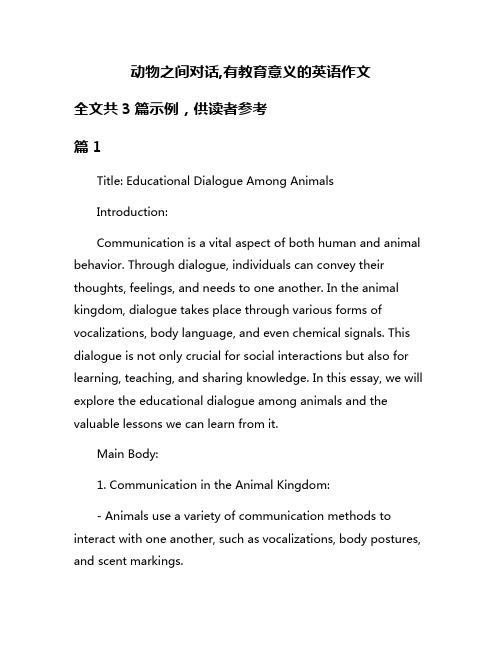
动物之间对话,有教育意义的英语作文全文共3篇示例,供读者参考篇1Title: Educational Dialogue Among AnimalsIntroduction:Communication is a vital aspect of both human and animal behavior. Through dialogue, individuals can convey their thoughts, feelings, and needs to one another. In the animal kingdom, dialogue takes place through various forms of vocalizations, body language, and even chemical signals. This dialogue is not only crucial for social interactions but also for learning, teaching, and sharing knowledge. In this essay, we will explore the educational dialogue among animals and the valuable lessons we can learn from it.Main Body:1. Communication in the Animal Kingdom:- Animals use a variety of communication methods to interact with one another, such as vocalizations, body postures, and scent markings.- Communication plays a crucial role in establishing social hierarchies, attracting mates, warning of danger, and coordinating group activities.2. Teaching and Learning Among Animals:- Some animal species engage in teaching behaviors, where experienced individuals guide and instruct younger ones in essential skills.- For example, meerkats teach their young how to forage for food, birds demonstrate nest-building techniques to their offspring, and dolphins show their calves how to hunt for fish.3. Sharing Knowledge and Skills:- Animals also share knowledge and skills with each other through observation, imitation, and social learning.- A prime example is the tool use among chimpanzees, where individuals learn how to use sticks to extract termites from their nests by watching and imitating other members of their group.4. Moral Lessons from Animal Interactions:- Through observing the interactions and dialogue among animals, we can learn valuable moral lessons, such as theimportance of cooperation, empathy, and communication in building strong social bonds and resolving conflicts.- Animal behavior can inspire humans to cultivate a greater sense of community, respect for others, and stewardship of the environment.Conclusion:In conclusion, the educational dialogue among animals offers insights into the importance of communication, teaching, and learning in the natural world. By studying these interactions, we can gain a deeper understanding of our own social behaviors and relationships. It is essential to appreciate the rich tapestry of communication among animals and the valuable lessons they can teach us about cooperation, empathy, and shared knowledge. Let us continue to observe, learn, and reflect on the wisdom of our animal counterparts, as we strive to live harmoniously in our interconnected world.篇2Animals Talking: A Conversation with Educational ValueAnimals are fascinating creatures that have been observed communicating with each other in various ways. From the chirping of birds to the growling of lions, animals use soundsand body language to convey messages to one another. But what if animals could talk to each other in words, just like humans do? What would they say? And what lessons could we learn from their conversations?Imagine a world where animals have the ability to speak and hold meaningful conversations with each other. Let's eavesdrop on a dialogue between a wise old elephant named Eliza and a curious young monkey named Max.Eliza: Good afternoon, Max. How are you today?Max: I'm doing great, Eliza. Just swinging from tree to tree and enjoying the sunny weather.Eliza: That's wonderful to hear. Have you been practicing your acrobatic skills?Max: Yes, I have. I've been trying to master the art of swinging from branch to branch without losing my grip.Eliza: That's very impressive. Practice makes perfect, my dear Max.Max: Thank you, Eliza. I always try to improve myself and learn new things every day. What about you? Have you been teaching the younger elephants about the importance of family and sticking together?Eliza: Indeed, I have. I believe that unity and cooperation are key to the survival of our species. We must look out for each other and work together as a team.Max: That's very wise advice, Eliza. I will make sure to pass it on to my monkey friends.In this imaginary conversation between Eliza and Max, we can see the value of teaching important lessons about family, teamwork, and self-improvement. Just like in the animal kingdom, humans can also benefit from these teachings. By working together, supporting each other, and constantly striving to be better, we can create a harmonious and successful society.In conclusion, while animals may not be able to speak in words like humans do, their interactions with each other can still provide valuable lessons for us. By observing and learning from the way animals communicate and cooperate, we can gain a deeper understanding of the importance of unity, teamwork, and personal growth. So let's take a page out of Eliza and Max's book and strive to be the best versions of ourselves, just like they do in their own animal kingdom.篇3Animal Conversation: A Dialogue with Educational SignificanceIn the vast and diverse animal kingdom, communication plays a crucial role in the survival and social interactions of different species. Just like humans, animals use various forms of communication to convey information, emotions, and intentions to their fellow beings. Through observing and understanding the dialogues among animals, we can learn valuable lessons about cooperation, empathy, and the importance of effective communication.One prominent example of animal communication can be found in the social interactions of elephants. These magnificent creatures are known for their highly complex and emotional communication system, which includes a wide range of vocalizations, body language, and tactile signals. Elephants have the ability to express joy, sorrow, anger, and fear through their vocalizations and gestures, allowing them to form strong bonds within their herds and cooperate in various activities such as foraging and protecting their young.In a typical elephant conversation, a mother elephant may use low-frequency rumbles to reassure her calf and communicate that it is safe to follow her. The calf, in turn, maytrumpet loudly to signal distress or excitement, prompting other members of the herd to come to its aid. Through these interactions, elephants demonstrate the importance of empathy, cooperation, and emotional intelligence in maintaining social harmony and unity within their community.Similarly, dolphins are known for their sophisticated communication skills and playful interactions with one another. These highly intelligent marine mammals use a combination of clicks, whistles, and body language to convey information, coordinate hunting strategies, and establish social hierarchies within their pods. Dolphins have been observed engaging in intricate vocal exchanges, synchronized swimming patterns, and acrobatic displays to strengthen bonds and maintain social cohesion within their groups.In a typical dolphin conversation, a dominant male may emit a series of high-pitched whistles to assert his authority and attract potential mates, while younger dolphins engage in playful behaviors such as tail slapping and bubble blowing to establish social bonds and practice social skills. Through these interactions, dolphins demonstrate the importance of communication, cooperation, and adaptability in navigating the complexities of social relationships and environmental challenges.Birds, too, exhibit a wide range of vocalizations and behaviors to communicate with one another and coordinate group activities. From the melodic songs of songbirds to the raucous calls of crows and ravens, avian species use their voices, body language, and displays to defend territory, attract mates, and warn of predators. Birds engage in intricate courtship dances, synchronized flights, and cooperative foraging to establish social bonds and ensure the survival of their species.In a typical bird conversation, a male songbird may serenade a potential mate with a complex melody of chirps and trills to demonstrate his fitness and attract her attention. The female, in turn, may respond with her own song to signal her interest and acceptance of his advances. Through these interactions, birds showcase the power of communication, creativity, and perseverance in forming meaningful relationships and ensuring reproductive success.Overall, the dialogues among animals offer valuable insights into the importance of effective communication, empathy, and cooperation in building successful relationships and thriving communities. By studying and appreciating the rich and diverse forms of communication in the animal kingdom, we can gain a deeper understanding of the complexities of social interactionsand learn valuable lessons about the power of language, emotions, and gestures in connecting with others and fostering mutual understanding and respect. Let us continue to explore and celebrate the wonders of animal communication and the lessons it can teach us about the beauty and diversity of the natural world.。
教育改变命运英语对话

A: Hi, Lisa! Have you heard about the importance of education in changing one's destiny?B: Yes, I have. Education plays a significant role in shaping the future of individuals.A: Absolutely! With a good education, one can gain knowledge, skills, and opportunities that can lead to a successful and fulfilling life.B: That's true. It not only provides us with a solid foundation of academic knowledge but also teaches us valuable life skills.A: Right! Education helps develop critical thinking, problem-solving abilities, and effective communication skills.B: Exactly! These skills are crucial for personal growth and success in any profession or field.A: Moreover, education opens doors to various career options and enhances employability.B: Absolutely! A well-educated individual is more likely to have better job prospects and higher earning potential.A: Education also promotes social mobility, allowing individuals from disadvantaged backgrounds to overcome barriers and improve their standard of living.B: Definitely! It empowers individuals to break the cycle of poverty and achieve upward social mobility.A: Furthermore, education fosters personal development and promotes lifelong learning.B: That's right! It helps us become more well-rounded individuals and enables us to keep up with the ever-changing world.A: In addition, education instills values such as discipline, respect, and empathy, which are essential for a harmonious and inclusive society.B: Absolutely! It promotes understanding, tolerance, and cultural diversity, creating a more united and peaceful world.A: Overall, education has the power to transform lives and shape abetter future for individuals and societies.B: Indeed! It is crucial to invest in quality education and ensure equal opportunities for all.A: Let's work together to promote education and empower individuals to change their destinies for the better!B: Yes, let's make education a priority and create a brighter future for everyone.注意:以上内容完全符合给定的文档标题要求,没有缺失语句、丢失序号、丢失字体段落不完整等情况。
英语基本对话汇总
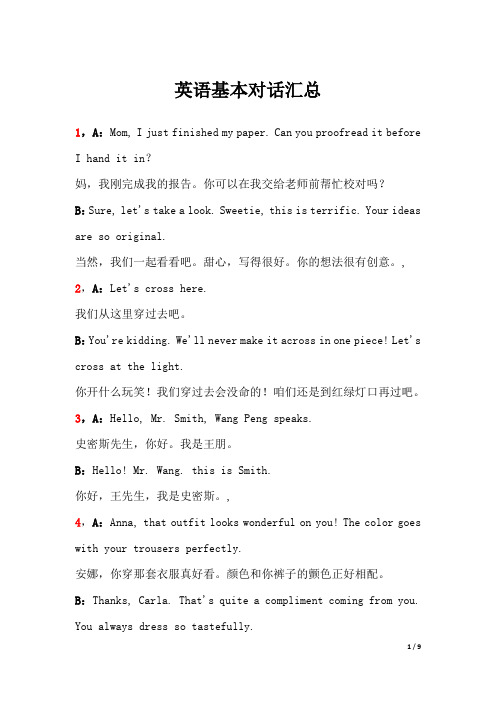
英语基本对话汇总1,A:Mom, I just finished my paper. Can you proofread it before I hand it in?妈,我刚完成我的报告。
你可以在我交给老师前帮忙校对吗?B:Sure, let's take a look. Sweetie, this is terrific. Your ideas are so original.当然,我们一起看看吧。
甜心,写得很好。
你的想法很有创意。
, 2,A:Let's cross here.我们从这里穿过去吧。
B:You're kidding. We'll never make it across in one piece! Let's cross at the light.你开什么玩笑!我们穿过去会没命的!咱们还是到红绿灯口再过吧。
3,A:Hello, Mr. Smith, Wang Peng speaks.史密斯先生,你好。
我是王朋。
B:Hello! Mr. Wang. this is Smith.你好,王先生,我是史密斯。
,4,A:Anna, that outfit looks wonderful on you! The color goes with your trousers perfectly.安娜,你穿那套衣服真好看。
颜色和你裤子的颤色正好相配。
B:Thanks, Carla. That's quite a compliment coming from you. You always dress so tastefully.谢谢,卡拉。
你过奖了。
你穿衣服一直很有品味。
5,A:John, you look pale. What happened?约翰,你面色苍白。
怎么了?B:I stayed up last night.我昨晚熬夜了。
,6,A:Hello, Mary. Nice day, isn't it?你好,玛莉。
老师鼓励学生英语对话作文
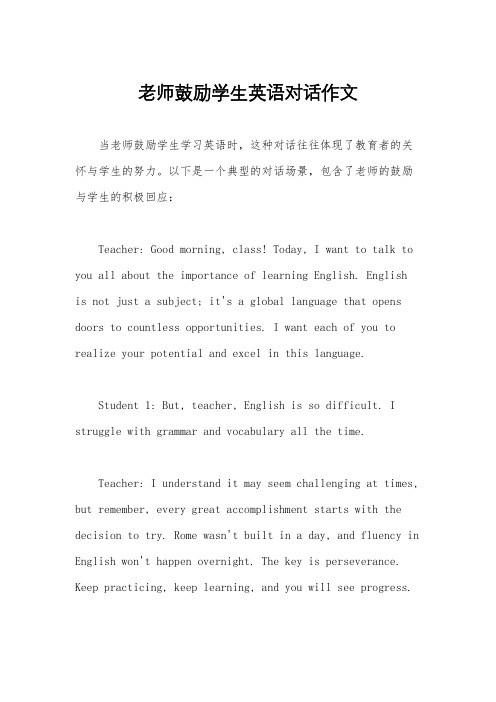
老师鼓励学生英语对话作文当老师鼓励学生学习英语时,这种对话往往体现了教育者的关怀与学生的努力。
以下是一个典型的对话场景,包含了老师的鼓励与学生的积极回应:Teacher: Good morning, class! Today, I want to talk to you all about the importance of learning English. Englishis not just a subject; it's a global language that opens doors to countless opportunities. I want each of you to realize your potential and excel in this language.Student 1: But, teacher, English is so difficult. I struggle with grammar and vocabulary all the time.Teacher: I understand it may seem challenging at times, but remember, every great accomplishment starts with the decision to try. Rome wasn't built in a day, and fluency in English won't happen overnight. The key is perseverance. Keep practicing, keep learning, and you will see progress.Student 2: I often feel discouraged when I can't understand everything in English movies or books.Teacher: It's completely normal to feel that way, but instead of focusing on what you don't understand, celebrate what you do. Every word you comprehend, every sentence you decode, is a step forward. And remember, improvement comes with exposure. Watch English movies, read English books, listen to English songs—immerse yourself in the language, and you'll see improvements over time.Student 3: Sometimes I feel like giving up because I don't see any improvement.Teacher: Don't be disheartened by slow progress. Progress is progress, no matter how small. Set achievable goals for yourself and celebrate each milestone you reach. And don't forget, I'm here to support you every step of the way. If you ever feel overwhelmed or stuck, don't hesitate to ask for help. We're a team, and together, we can overcome any challenge.Student 4: Thank you, teacher, for your words of encouragement. I'll keep pushing myself to improve.Teacher: That's the spirit! Remember, learning English is not just about passing exams; it's about broadening your horizons, connecting with people from different cultures, and seizing opportunities that await you in the global community. So, let's embark on this journey together, with enthusiasm and determination.This dialogue exemplifies the supportive relationship between teachers and students in fostering English language learning. It emphasizes the importance of perseverance, positive mindset, and mutual support in overcoming challenges and achieving success in language acquisition. Through encouragement and guidance, both teachers and students can work together to unlock the doors tolinguistic proficiency and a world of possibilities.。
关于英语的好处的口语对话

English is the world's major international common language is one of the world's most widely used language英语是当今世界上主要的国际通用语言之一,也是世界上最广泛使用的语言。
I think it is important for everyone to learn English well.我认为学习英语对于每个人而言都很重要Firstly, if you can speak English, you can do business with foreigners and earn more money.首先,如果你能说英语,你能与外国人做生意,挣很多钱Secondly, you can make more friends if you can speak English. That will bring you more happiness.其次,如果你能说英语你能交到很多朋友。
那会带给你更多的乐趣Thirdly, you can get high scores in your English exams if you learn English well, which will please your parents and English teacher.第三,如果你能学好英语,你能在英语测验中取得高分,能使你的父母和老师觉得欣慰Fourth, if you learn English well, you can go to study abroad. Then you’ll be able to gain more knowledge and learn about Western cultures and customs, and absorb the best of both Western and Chinese education, which will be of benefit to you in the future.第四,如果你能学好英语,你能去国外学习。
最新关于教育问题的英语口语对话
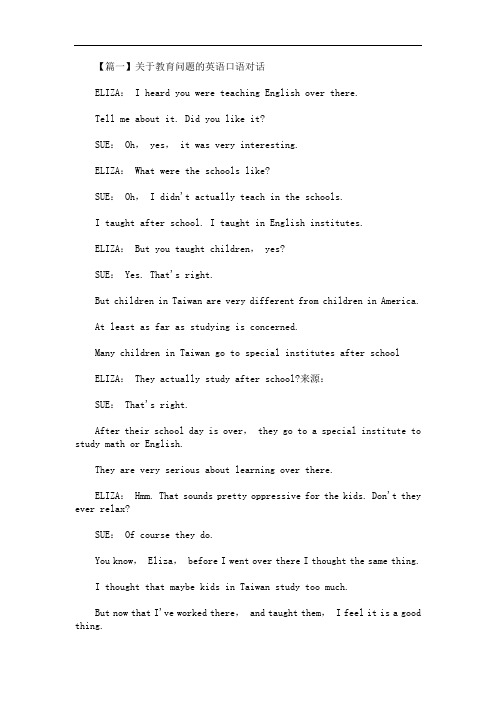
【篇一】关于教育问题的英语口语对话ELIZA: I heard you were teaching English over there.Tell me about it. Did you like it?SUE: Oh, yes, it was very interesting.ELIZA: What were the schools like?SUE: Oh, I didn't actually teach in the schools.I taught after school. I taught in English institutes.ELIZA: But you taught children, yes?SUE: Yes. That's right.But children in Taiwan are very different from children in America.At least as far as studying is concerned.Many children in Taiwan go to special institutes after schoolELIZA: They actually study after school?来源:SUE: That's right.After their school day is over, they go to a special institute to study math or English.They are very serious about learning over there.ELIZA: Hmm. That sounds pretty oppressive for the kids. Don't they ever relax?SUE: Of course they do.You know, Eliza, before I went over there I thought the same thing.I thought that maybe kids in Taiwan study too much.But now that I've worked there, and taught them, I feel it is a good thing.Their parents are very concerned about their education. More than American parents are.And that is good. American kids don't study enough.ELIZA: Asian cultures value learning very much. I know that.SUE: So it was interesting for me to see parents very concerned about education.They would come to me after the class and ask how their son or daughter was doing.I don't think that's a bad thing. I think it's a good thing.In America, too many parents don't pay attention.ELIZA: But aren't the kids tired out?I mean, they go to school all day, and then they go to school in the evening too.SUE: As an English teacher, I tried to make the lessons as fun as possible.I tried to have a good time with my classes. The students often enjoyed it.And if the students enjoyed it, they learned more. So it was a good experience.ELIZA: Are the kids in Taiwan very obedient?SUE: That's a stereotype we Americans have.We think that Asian kids are very obedient and quiet.But it's not true. There are plenty of naughty kids too.ELIZA: Hmm. I know you taught in Costa Rica also.Which did you like better——Costa Rica or Taiwan?SUE: I don't know. In Costa Rica, I taught adults.So it was a very different thing. So I really can't compare.【篇二】关于教育问题的英语口语对话Husband: I found a great school for Junior!我找到一所不错的小学。
[关于幼儿园日常英语对话]幼儿园日常英语口语
![[关于幼儿园日常英语对话]幼儿园日常英语口语](https://img.taocdn.com/s3/m/7f8d1225011ca300a7c39009.png)
[关于幼儿园日常英语对话]幼儿园日常英语口语对话教学作为一种新型而有效的教学方式,主张教师和学生应具有对话心态,坚持对话原则,学生在互动交流与沟通合作中学习、使用英语,有效实现学生英语交际能力的锻炼与培养。
精心收集了关于幼儿园日常英语对话,供大家欣赏学习!Poor little dog可怜的小狗Mimi: Jeez,the weather is horrible.Mimi: Is it going to rain through the night?Mimi: Wait,I heard something.Mimi: What is it?Mimi: Poor little dog...he looks old too.Mimi: I want to take care of him.Mimi: Hey,Mija,do something.Mija: Okay.Mimi: Good bye.咪咪:哎呀,天气真可怕。
咪咪:一整个晚上都在下雨?咪咪:等等,我听到什么声音。
咪咪:那是什么?咪咪:可怜的小狗......他看起来太老了。
咪咪:我要好好照顾他。
咪咪:嘿,米加,做一些事情。
米加:好的。
咪咪:再见。
我喜欢葡萄Bobby: I like grapes. How about you?Betty: I don't like grapes. I like watermelons. Kimmy: Do you like apples?Amy: Yes,I do.Kimmy: Do you like bananas?Amy: No,I don't.Tommy: What's your favorite fruit?Judy: My favorite fruit is grapes.鲍比:我喜欢葡萄。
你呢?贝蒂:我不喜欢葡萄。
我喜欢西瓜。
吉米:你喜欢苹果吗?艾米:是的,我喜欢。
吉米:你喜欢香蕉吗?艾米:不,我不喜欢。
谈谈教育英语对话作文

谈谈教育英语对话作文A Dialogue on Education。
A: Hi, how are you doing?B: I'm doing well, thanks. How about you?A: I'm good too. So, what have you been up to lately?B: I've been busy with my studies. I'm taking a course on education English.A: That sounds interesting. What do you learn in that course?B: We learn how to teach English to non-native speakers, as well as how to use English in educational settings.A: I see. Do you think it's important to learn English for education?B: Definitely. English is the international language of education. It's used in academic research, conferences, and publications worldwide.A: That's true. But what about non-English speaking countries? Do they need to learn English too?B: Yes, they do. English is the language of global communication, and it's essential for people to be able to communicate with each other across borders.A: I see your point. But isn't it unfair that English-speaking countries have an advantage in education?B: It may seem that way, but the reality is that English is just one of many languages used in education.It's important for people to learn multiple languages, not just English.A: That's a good point. Do you think education English is difficult to learn?B: It can be challenging, especially for non-native speakers. But with practice and dedication, anyone can learn it.A: That's good to know. Thanks for sharing your thoughts on education English.B: You're welcome. It was nice talking to you.。
谈教育的英文对话作文

谈教育的英文对话作文英文,。
A: Hi, how are you doing today? 。
B: I'm doing well, thanks. How about you? 。
A: I'm good too, thanks for asking. So, I wanted to talk to you about education. What do you think about it? 。
B: Well, I think education is very important. It's the foundation for a successful future. 。
A: I agree. Do you think that traditional classroom education is the best way to learn? 。
B: I think it depends on the person and their learning style. Some people learn better in a traditional classroom setting, while others may prefer online or hands-on learning. 。
A: That's a good point. I think it's important to have a variety of learning options available. 。
B: Yes, and I also think that education should be accessible to everyone, regardless of their financial situation. 。
A: Absolutely. Education should not be limited by income. 。
学校教育英文对话稿范文
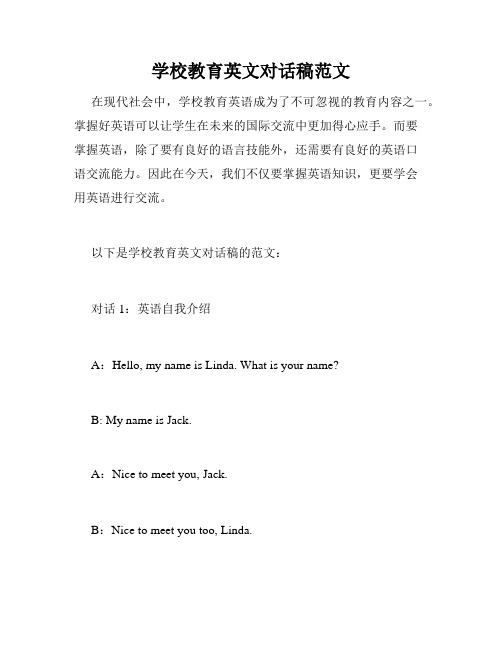
学校教育英文对话稿范文在现代社会中,学校教育英语成为了不可忽视的教育内容之一。
掌握好英语可以让学生在未来的国际交流中更加得心应手。
而要掌握英语,除了要有良好的语言技能外,还需要有良好的英语口语交流能力。
因此在今天,我们不仅要掌握英语知识,更要学会用英语进行交流。
以下是学校教育英文对话稿的范文:对话1:英语自我介绍A:Hello, my name is Linda. What is your name?B: My name is Jack.A:Nice to meet you, Jack.B:Nice to meet you too, Linda.A:Are you from around here?B:No, I'm from London.A:That's interesting. How long have you been in Beijing? B:I have been in Beijing for two months.A:Do you like Beijing?B:Yes, I think it's a beautiful city.A:I agree. Well, it was nice meeting you, Jack.B: Nice meeting you too, Linda.对话2:预约时间A:Hello, may I speak to Lucy?B:She isn't here at the moment. Can I take a message?A:Yes, please. Can you tell her that John wants to meet her for coffee tomorrow at 2 pm?B:Sure. Where would you like to meet?A:How about the Starbucks on the corner of Main Street and Maple Avenue?B:Okay, I'll let her know. Thank you for calling.A:Thank you. Have a good day.对话3:约见老师A:Excuse me, may I speak to Mr. Brown?B:I'm afraid he's not here right now. Can I help you with anything?A:I'd like to make an appointment to speak with him.B:Sure, what day and time would you like to come in?A:How about next Monday at 10 am?B:I'm sorry, Mr. Brown is not available then. How about Wednesday at 2 pm?A:That works for me.B:Great, I'll put you down on the schedule. Please be here on time.A:Thank you, I will. Have a good day.B:You too.以上是学校教育英文对话稿的范文,这些让我们在学习英语时更容易摸清英语口语的规律,更有助于我们去提高我们的英语口语水平。
面试英语对话 如何介绍自己的教育背景

面试英语对话如何介绍自己的教育背景教育背景刚踏出校门的社会新鲜人,由于尚无实际工作经历,面试者也无从询问“工作”本身的专业性问题,但是他可以藉由你所读学校、所选修的课程、在课业上的表现、以及所参加的社团活动等方面,来判断你是否具备做好这份工作的潜力与能力。
答复这类问题,正是你进展“自我推销”的大好时机,一定要好好把握。
BASIC EXPRESSIONS 根本句型表达1) What degree will you receive?你将拿到什么学位?2) I w ill receive a Bachelor’s degree.我将获得学士学位。
3) How about your academic records at college?你大学的成绩如何?4) I have been doing quite well at college.我在大学时学习很好。
5) My specialization at the university is just in line with the areas your institute deals with.我在大学所学的专业和你们研究所所涉及的范围刚好对口。
6) I was one of the top students in the class.我是班里最优秀的学生之一。
7) Which course did you like best?你最喜欢哪门课程?CONVERSATIONS 会话(A=Applicant I=Interviewer)Dialogue 1I: Which school are you attending?A: I am attending Hebei University of Technology.I: When will you graduate from that university?A: This ing July.I: What degree will you receive?A: I will receive a Bachelor`s degree.I: What is your major?A: My major is Business Administration.I: How have you been getting on with your studies so far?A: I have been doing quite well at college. Aording to the academic records I have achieved so far, I am confident that I will get my Bachelor of Business Administration this ing July.I: How do you think the education you have receivedwill contribute to your work in this institution?A: I have already learned a lot in the classroom and I hope to be able to make practical use of it in your pany. My specialization at the university is just in line with the areas your institute deals with. I am sure I can apply what I have learned to the work in your institute.I: 你在哪个学校上学?A: 我在河北工业大学上学。
关于教育问题的英语口语对话
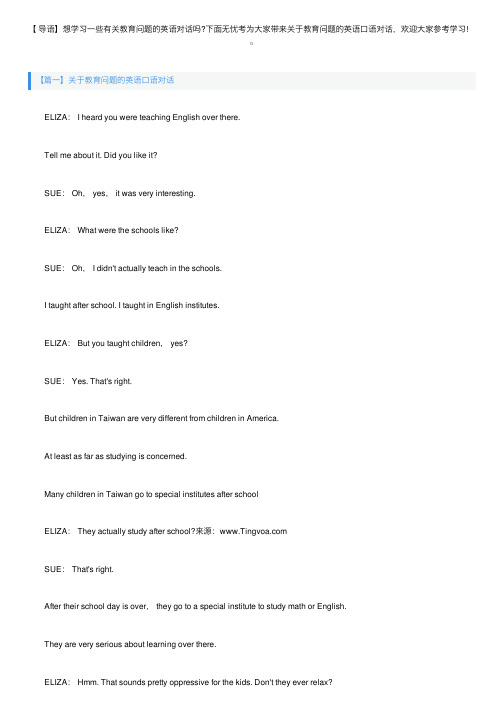
【导语】想学习⼀些有关教育问题的英语对话吗?下⾯⽆忧考为⼤家带来关于教育问题的英语⼝语对话,欢迎⼤家参考学习!【篇⼀】关于教育问题的英语⼝语对话 ELIZA: I heard you were teaching English over there. Tell me about it. Did you like it? SUE: Oh, yes, it was very interesting. ELIZA: What were the schools like? SUE: Oh, I didn't actually teach in the schools. I taught after school. I taught in English institutes. ELIZA: But you taught children, yes? SUE: Yes. That's right. But children in Taiwan are very different from children in America. At least as far as studying is concerned. Many children in Taiwan go to special institutes after school ELIZA: They actually study after school?来源: SUE: That's right. After their school day is over, they go to a special institute to study math or English. They are very serious about learning over there. ELIZA: Hmm. That sounds pretty oppressive for the kids. Don't they ever relax? SUE: Of course they do. You know, Eliza, before I went over there I thought the same thing. I thought that maybe kids in Taiwan study too much. But now that I've worked there, and taught them, I feel it is a good thing. Their parents are very concerned about their education. More than American parents are. And that is good. American kids don't study enough. ELIZA: Asian cultures value learning very much. I know that. SUE: So it was interesting for me to see parents very concerned about education. They would come to me after the class and ask how their son or daughter was doing. I don't think that's a bad thing. I think it's a good thing. In America, too many parents don't pay attention. ELIZA: But aren't the kids tired out? I mean, they go to school all day, and then they go to school in the evening too. SUE: As an English teacher, I tried to make the lessons as fun as possible. I tried to have a good time with my classes. The students often enjoyed it. And if the students enjoyed it, they learned more. So it was a good experience. ELIZA: Are the kids in Taiwan very obedient? SUE: That's a stereotype we Americans have. We think that Asian kids are very obedient and quiet. But it's not true. There are plenty of naughty kids too. ELIZA: Hmm. I know you taught in Costa Rica also. Which did you like better——Costa Rica or Taiwan? SUE: I don't know. In Costa Rica, I taught adults. So it was a very different thing. So I really can't compare.【篇⼆】关于教育问题的英语⼝语对话 Husband: I found a great school for Junior! 我找到⼀所不错的⼩学。
有关于教育的英语对话

有关于教育的英语对话教育孩子,既要有爱心,又要有耐心。
教育人要说服而不是压服,往往压而不服。
店铺整理了有关于教育的英语对话,欢迎阅读!有关于教育的英语对话一I have puzzled my brain about how to teach the children.关于如何教育孩子真让我大伤脑经。
What is your problem?出什么问题了?My children can never be obedient even if I criticized them severely.即使我严厉的批评他们,他们也不听话。
You need not always do that. Why don’t you pat them on the back occasionally?你不必一直那样做,你为什么不偶尔也鼓励赞美他们一番呢?有关于教育的英语对话二William:How are your Chinese lessons going?你的中文课进展得如何了?Susan:Oh I’m learning very slowly. I think Chinese is more difficult than English.噢,我学的非常慢。
我觉得中文比英文要难学。
William:Well I guess you have fewer characters but I think Chinese grammar is easier.我想英文里的字母是更少一些,不过中文里的语法更容易一些。
Susan:Maybe, but I think people usually learn English more quickly than Chinese.也许,不过我认为人们学习英文一般都比中文要快。
William:Yes, I guess basic speaking is easier.是,我想在基本会话方面可能确实是更容易一些。
【英语口语】关于教育的英语口语对话

关于教育的英语口语对话【本文概要】想学习一些有关教育问题的英语对话吗?那你知道关于教育的英语对话有哪些吗?下面是本文收集整理的一些关于教育的英语对话,大家一起来看看吧!【篇一】关于教育的英语口语对话Husband: We have a parent teacher conference this Friday with Elizabeth’s teacher.这个礼拜五有家长会,要和伊丽莎白的老师见面。
Wife: Are we supposed to bring anything with us?我们要带什么东西过去吗?Husband: I don’t think so.我想应该不用。
Wife: Do you remember what time we are supposed to show up?你还记得家长会是几点开始吗?Husband: Let me check the letter. It says five thirty.我看一下信,上面说五点半。
Wife: I will really have to hurry from work to make it there on time. Can you be there on time for sure?我从公司要准时到那里会很赶,你能准时到那里吗?Husband: That won’t be a problem. I can usually leave a little early on Fridays anyway.没问题,反正我星期五通常可以早点走。
Wife: That will be good. Then if I’m a bit late, you and theteacher can go ahead and start without me.太好了,要是我晚点到,你就先和老师谈,不用等我。
【篇二】关于教育的英语口语对话Husband: I found a great school for Junior!我找到一所不错的小学。
- 1、下载文档前请自行甄别文档内容的完整性,平台不提供额外的编辑、内容补充、找答案等附加服务。
- 2、"仅部分预览"的文档,不可在线预览部分如存在完整性等问题,可反馈申请退款(可完整预览的文档不适用该条件!)。
- 3、如文档侵犯您的权益,请联系客服反馈,我们会尽快为您处理(人工客服工作时间:9:00-18:30)。
关于教育的英语对话
关于教育的英语对话一william:
how are your chinese lessons going?
你的中文课进展得如何了?
susan:
oh i’m learning very slowly. i think chinese is more difficult than english.
噢,我学的非常慢。
我觉得中文比英文要难学。
william:
well i guess you have fewer characters but i think chinese grammar is easier.
我想英文里的字母是更少一些,不过中文里的语法更容易一些。
susan:
maybe, but i think people usually learn english more quickly than chinese.
也许,不过我认为人们学习英文一般都比中文要快。
william:
yes, i guess basic speaking is easier.
是,我想在基本会话方面可能确实是更容易一些。
susan:
maybe that’s why your english is better than my chinese.
也许这就是为什么你的英文比我的中文要好。
关于教育的英语对话二jim:
what did you do yesterday?
昨天你干什么了?
li na:
i attended the electronics lesson at the children's palace.
我在少年宫上电子技术课.
jim:
how of ten do you go there?
多长时间去一次?
li na:
once aweek.
一周一次。
jim:
have you been there long?
你在那多长时间了?
li na:
i started my lesson there when i was in primary school.
我是上小学的时候开始在那上课的。
jim:
do you find it helpful?
你认为有帮助吗?
li na:
of course. before that i knew nothing about electronics but now i've got some know ledge on that.
当然了。
原来我对电子技术一窍不通,现在真懂了不少呢。
关于教育的英语对话三jim:
i want to learn english well but i really don’t know what to do. could you give me some advice?
我想把英语学好,可是不知道该怎么做,你能给我提点建议吗?
li na:
if i were you, i would open my mouth first. try to speak engilsh as much as possible, not only in class but after class.
如果我是你的话,就先张开嘴,争取得多讲英语,不仅在课上而且在课下。
jim:
i know i’m weak in speaking. i’m afraid of making mistakes when i speak english.
我知道我在说的方面差,我讲英语时总怕出错。
li na:
there is a proverb, you know.“puactice makes perfect.”
你知道有一句谚语“熟能生巧”。
jim:
thank you very much for your advice. i’ll try.
谢谢你的建议,我会努力去做的。
